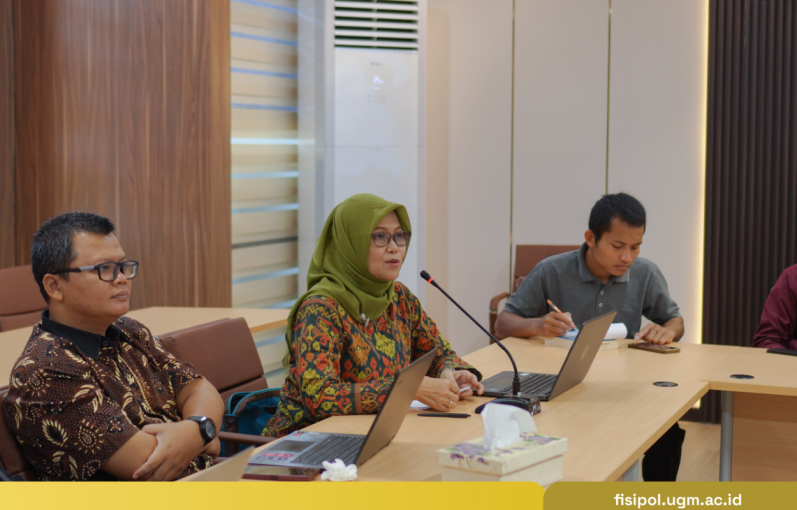
Yogyakarta, 8 November 2024–Global geopolitical tensions are characterised by several conflicts between countries, such as the genocide in Gaza, the war in Ukraine, and the South China Sea dispute. Southern developing and underdeveloped countries that are members of the Global South are forced to take sides in the midst of these geopolitical tensions. In response to this issue, the Institute of International Studies (IIS), Faculty of Social and Political Sciences UGM organised the annual GO-SOUTH 2024 convention entitled ‘Global South in Geopolitical Turbulence’ on Friday (8/11).
The first discussion presented Japan. The first discussion was presented by Dr Siti Daulah Khoiriati from the Department of International Relations UGM and Yako Kozano from the School of Foreign Studies, Aichi Prefectural University on ‘Japan in Asia: Past, Present, & Future’. Japan is a major player in Asia that influences regional countries. Although recognised as a developed country with rapid technological progress, the development of research on Japan is still affected by the political situation.
“So far, research on Japan in Indonesia is not considered independent. It depends on the research institution and the government’s interests,” Siti explained. Many studies are conducted based on government and institutional interests. Siti gave an example: when the government wants to see market opportunities in Japan, some educational institutions’ demand for the topic increases. This also happens because Japan directly funds a lot of research.
“Most emerging research themes are related to Japan’s success in dominating global economic power, technological development, and culture. But very few discuss Japanese politics and international relations,” she added. She continued by saying that young people’s interest in Japanese research differs from previous research themes. Japanese research tended to discuss history and economic dominance in the past, but today, students are more interested in Japanese pop culture.
Next, Yako Kozano explained how Indonesia affects Japan regarding exports and imports. In his material, Yako saw that Indonesia has long been Japan’s trading partner, especially for coal, palm oil, and natural gas commodities. However, as Indonesia’s export policy changes, Japan imports many small industrial products from Indonesia.
“But increasingly, the People’s Republic of China (PRC) can produce more light industrial material goods from Indonesia. So, Indonesian products are being rejected,” Yako explained. As a result, Indonesia returned to being an exporter of raw goods. This condition has led to the relationship between Japan and Indonesia being based on trading partners instead of using a geopolitical approach.
China’s dominance in Asia has also affected the alignments of Southeast Asian countries. Indonesia, as a non-aligned country, progressively maintained neutrality in geopolitical tensions. However, the government’s strategy to strengthen Indonesia’s influence is to join PRC and non-PRC allied organisations. Yako is concerned about how Indonesia maintains the non-aligned principle when ASEAN countries are encouraged to choose alignments.
In the next session, Agus Haryanto from the Department of International Relations, Universitas Jenderal Soedirman, highlighted how Japan supports international security through its Official Development Assistance (ODA) programme and Self-Defence Forces (SDF) deployment. In addition, Japan has also shown its influence on Indonesian culture. Isao Yamazaki from the Faculty of Regional Art and Design, Saga University, said that Japanese culture and propaganda influenced many aspects of Indonesian culture.
The GO-SOUTH 2024 event was followed by a panel discussion session that also featured experts and academics from various national and international campuses. The organisation of this convention is a form of contribution from the Faculty of Social and Political Sciences UGM in prioritising the implementation of the 16th Sustainable Development Goals (SDGs), namely Peace, Justice, and Strong Institutions.
